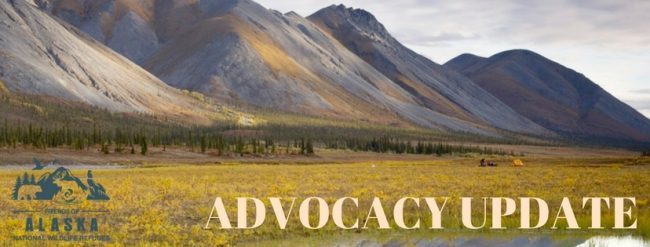by Board President, David Raskin

Oil Drilling in the Arctic Coastal Plain
The 2017 tax law mandated the sale of oil leases in the Coastal Plain of the Arctic National Wildlife Refuge. The proposed oil development would devastate the biological integrity and wilderness character of the crown jewel of National Wildlife Refuge System. It would violate the 1987 signed agreement between the governments of the United States and Canada to protect the porcupine caribou herd that is critical to the subsistence lifestyle and spiritual well-being of the Gwich’in people of Alaska and Canada. The Department of Interior has fast-tracked this process with a goal of completing a draft environmental statement (DEIS) in less than six months. They have held scoping meetings in Alaska and Washington, DC to receive public comments on what should be included in the DEIS. Along with many others, I testified at the Anchorage hearing to express our opposition to the proposed drilling and to urge thorough examinations of the many issues and problems posed by oil drilling and production (see above). The deadline to submit comments is June 19. You can email them to: blm_ak_coastalplain_EIS@blm.gov
Click here to sign on to our petition demanding the suspension of this ill-conceived scheme or submit your individual comments regarding drilling in the Arctic Refuge to the BLM by clicking here. (the comment link is on the right hand side of the page under “Submit Scoping Comments” please submit comments on the Notice of Intent)
Predator Control
The National Park Service has proposed amendments to its regulations for sport hunting and trapping in national preserves in Alaska. The proposed rules are published at https://federalregister.gov/d/2018-10735. These new rules would remove a regulatory provision issued by the National Park Service in 2015 that prohibited certain sport hunting practices that are otherwise permitted by the State of Alaska. The proposed rules are consistent with Alaska rules that allow taking any black bear, including cubs and sows with cubs, with artificial light at den sites; harvesting brown bears over bait; taking wolves and coyotes (including pups) during the denning season (between May 1 and August 9); taking swimming caribou; taking caribou from motorboats under power; taking black bears over bait; and using dogs to hunt black bears. These methods are inconsistent with responsible wildlife management and are opposed by many biological experts, including those who formulated the rules previously adopted by the National Park Service and the U.S. Fish and Wildlife Service, and the current rules for the Kenai National Wildlife Refuge, which are also being revised. The deadline to submit comments on the proposed Park Service rules is July 23, 2018.
Izembek Land Trade and Road
Recently, the Alaska Department of Transportation inquired about a permit for additional survey work in the proposed road corridor that would involve drilling into the substrate and construction of facilities. The Fish and Wildlife Service informed them that would not be possible as long as the land remains in federal ownership. The lawsuit challenging the proposed land trade and road through the heart of the Izembek wilderness is pending in the Anchorage Federal District Court as Trustees for Alaska continues its excellent legal work on behalf of Friends and eight other conservation organizations who oppose the proposed land trade and road. This process is working through the many necessary legal steps, and we remain optimistic that we will prevail against this destructive, costly, and unnecessary project.
